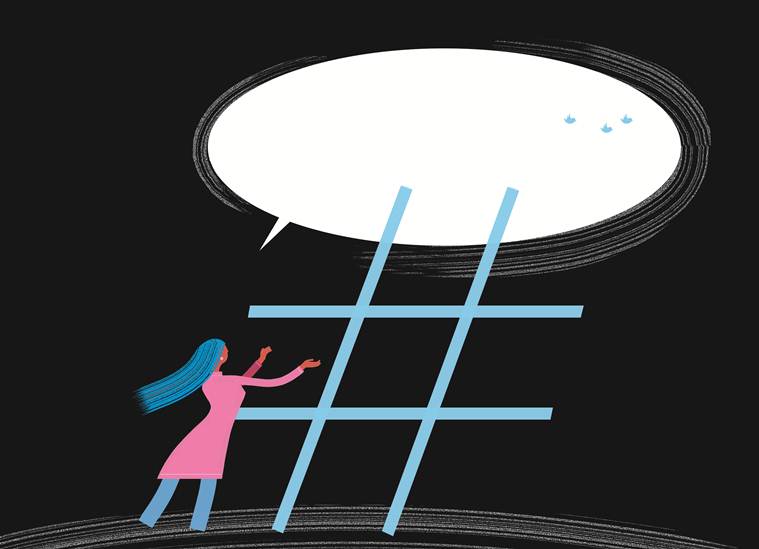Why #MeToo must be impolite
We need something loud, destructive, and unwieldy to move the needle

#MeTooIndia has been criticised as being a movement for liberal elite women, but as long as it spreads like wildfire from there, who cares who was there fanning the fires? (Illustration: CR Sasikumar)
As quickly as #MeToo took off in India, we are already hearing the inklings of a backlash.
Over the past few days, I’ve heard a lot of talk about how certain allegations “are not what MeToo is about,” or that the movement has now “gone too far,” or that the Twitter rage directed at men “undercuts” the whole movement. People have suggested the movement is devalued because alleged misconduct between two people can never be definitively proven, or that this #MeTooIndia wave is only a privileged woman’s conversation, because the amplified voices are elite, upper-caste women.
All of these arguments are missing the point.
#MeToo is a movement about equality, full stop. #MeToo is about dismantling hierarchies of power that have existed for centuries, in our governments, court systems, corporate offices, family homes, and cultural institutions. Because power has always been consolidated into the hands of men, men have also been the ones framing laws and rules and social norms around their experiences. As a result, most social norms, and our processes for re-evaluating them, have excluded the voices, perspectives, and experiences of women. What we are now experiencing is the collective outpouring of rage over centuries of institutionalised sexism.
While sexual assault and sexually predatory behaviour are the substance of #MeToo allegations, this is really a movement about abuse of power. If there’s anything the past few weeks have shown us, it’s that incidents of abuse of power are pervasive; they happen across socio-economic levels, castes, religions, and geographies. Women’s rage at these injustices is erupting all over the world, showing us just how universal this has become in patriarchal societies.
It makes sense that the spark igniting a global reckoning is one focused on sexual assault. It’s one of the most stigmatising experiences a woman can have, in any society, with long-term consequences for her mental, emotional, and physical well-being. It’s also one of the most denigrating — survivors of sexual assault or harassment are frequently ignored, discredited, ridiculed, shamed. The injustice is so raw: This is the abuse of power that occurs in our most intimate worlds, and touches on our most personal and private realms. As such, it feels, in many ways, like the most violative. And that’s precisely what makes #MeToo so powerful: It has brought our most private and emotionally difficult experiences to the fore.
With its sheer scope and size, #MeToo forces us to urgently confront definitions that weren’t built by, and don’t consider, at least half the world’s population. The outpouring of accusations on social media feels anarchic, but only a deluge has the power to convince us of the pervasiveness and scale of this problem. Anonymous accounts of abusive behaviour are certainly hard to investigate, but in societies where shame, stigma, and ostracism have followed women who do speak out, anonymity is a necessary middle step between no one coming forward and everyone proudly coming forward to call out abusers. #MeTooIndia has been criticised as being a movement for liberal elite women, but as long as it spreads like wildfire from there, who cares who was there fanning the fires?
#MeToo may not be a perfect movement in its current form, but no movement that demands an upheaval of our social norms ever is. We need something loud, destructive, and unwieldy to move the needle; our previous polite conversations about gender equality have not worked. #MeToo can be the proverbial last straw that brings patriarchal norms to heel.
But if it’s successful, #MeToo is hopefully also the beginning of a much larger and more important reckoning with how our societies treat the less powerful. #MeToo has shown us that old definitions that favour and protect one group at the expense of another are no longer acceptable; we’ll have to redraw and redefine boundaries that are more inclusive. #MeToo demands that people who have traditionally not had a voice, now have one; that people who have not had power, now gain it. And that necessarily means that the people who have always had power will need to give some up. It’s no wonder people are resisting this difficult and complicated conversation.
If we are able to redefine the norms around consent and masculinity that are at the core of #MeToo, we’ll also be ushering in broader change. We’ll be working towards a world where there is no female infanticide, no domestic violence, no eve-teasing on the streets, no barriers to girls’ education, no gender discrimination in homes and workplaces. We’ll become more sensitive and receptive to the voices of others, and more focused on the inclusion of traditionally marginalised groups in our homes, schools, and workplaces.
#MeToo can affect sweeping, global change in how we think about gender inequality. If you believe in that end result, then we should spend less time debating each individual allegation, or parsing the form it takes, and more time in throwing the full weight of our support behind a movement that truly has the power to change the world.
The writer is editor of TheSwaddle.com, a family health and culture magazine in India
For all the latest Opinion News, download Indian Express App
More From Karla Bookman
- The Community FallacyEven before Cambridge Analytica, there were lessons from Facebook’s functioning..
- Kitchen sets and cricket batsGender inequality begins with separation, and desensitisation to it..
- Parenting The iPad GenerationTechnology can be a great learning tool for kids, but only if parents use it right...








































No hay comentarios:
Publicar un comentario